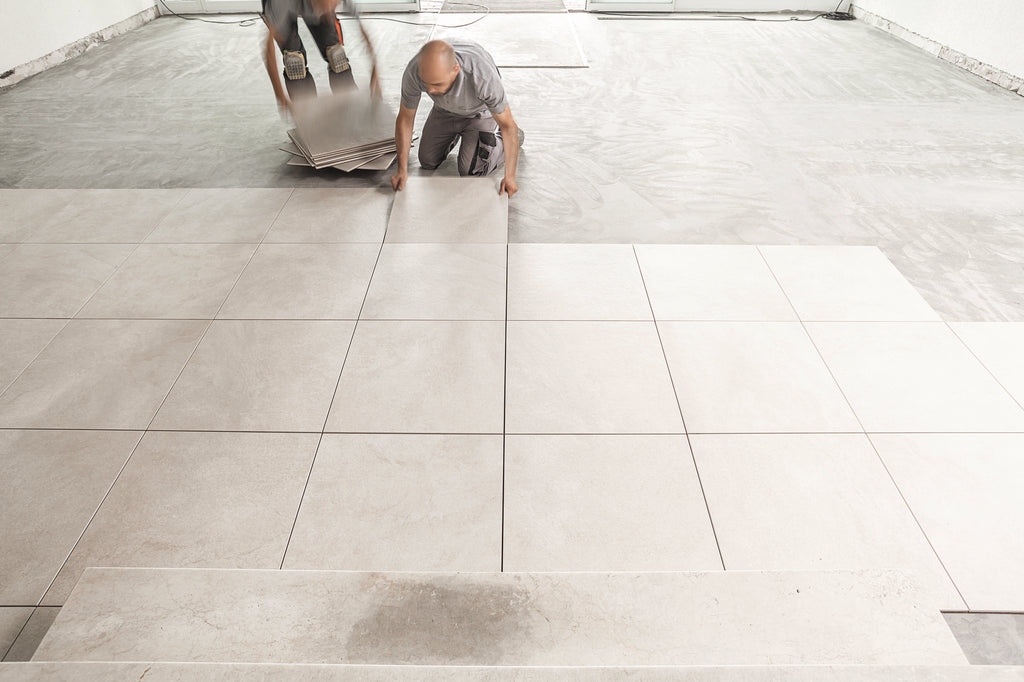
What kind of tiles are the hardest to break?
Tiles are a popular choice for flooring, backsplashes, and walls in both residential and commercial settings. They come in a variety of materials, sizes, shapes, and colors to fit any design aesthetic. However, not all tiles are created equal when it comes to hardness and durability. To determine the durability of tile you can use a system called the renoz.ca Hardness rating. Which is a simplified version of the Moh's system.
Shop Canada's most durable tiles now at 50% off
Ceramic and porcelain tiles are some of the hardest and most durable tiles available. These tiles are made from a mixture of clay and other natural materials, which are fired at high temperatures to create a hard, dense, and non-porous surface. Ceramic and porcelain tiles have a Mohs rating of 7 or 8 out of 10, which means they are highly resistant to scratches and abrasions. They are also stain-resistant, water-resistant, and easy to clean, making them ideal for high-traffic areas such as kitchens, bathrooms, and entryways.
What kind of tiles are the hardest to break? Answered in chart format.
| Type of Tile | Renoz Hardness Rating |
|---|---|
| Ceramic | 7-8 |
| Porcelain | 7-8 |
| Granite | 6-7 |
| Quartzite | 7-8 |
| Basalt | 6-7 |
| Limestone | 3-4 |
| Travertine | 4-5 |
Natural stone tiles, on the other hand, can vary in hardness depending on the type of stone. Granite, for example, is one of the hardest natural stones, with a Mohs rating of 6-7, making it highly resistant to scratches and chipping. Other hard natural stone tiles include quartzite and basalt, which have similar Mohs ratings. However, softer natural stones such as limestone and travertine can be more prone to scratches and damage, especially if they are not properly sealed and maintained.
When it comes to durability, the installation and maintenance of tiles are just as important as the type of tile itself. Proper installation can help prevent cracking, shifting, and other types of damage, while regular cleaning and sealing can help protect the surface from stains, scratches, and wear and tear.
In addition, different types of tiles have different benefits and drawbacks depending on their intended use. For example, while ceramic and porcelain tiles are highly durable and low-maintenance, they can be slippery when wet and may not be suitable for outdoor use. Natural stone tiles can add a unique and natural aesthetic to a space, but they may require more maintenance and care than other types of tiles.
In conclusion, the hardness and durability of tiles depend on the type of tile,
here is a list of some of the hardest and most durable types of tiles that are least likely to break:
-
Porcelain Tiles: Porcelain tiles are made from a mixture of clay and other natural materials, which are fired at high temperatures to create a hard, dense, and non-porous surface. They are highly durable and resistant to scratches, stains, and chipping, making them ideal for high-traffic areas such as kitchens, bathrooms, and entryways.
-
Ceramic Tiles: Ceramic tiles are similar to porcelain tiles in terms of their manufacturing process and durability. They have a Mohs rating of 7-8 out of 10, which means they are highly resistant to scratches and abrasions. They are also stain-resistant, water-resistant, and easy to clean, making them a popular choice for both residential and commercial use.
-
Granite Tiles: Granite is a natural stone that is highly durable and resistant to scratches and chipping. It has a Mohs rating of 6-7 out of 10, which makes it harder than most other natural stones. Granite tiles are also heat-resistant, making them ideal for use in kitchens and other areas where hot surfaces may be present.
-
Quartzite Tiles: Quartzite is another natural stone that is highly durable and resistant to scratches and chipping. It has a Mohs rating of 7-8 out of 10, which makes it one of the hardest natural stones available. Quartzite tiles are also resistant to heat and stains, making them a good choice for kitchen countertops and floors.
-
Basalt Tiles: Basalt is a volcanic rock that is highly durable and resistant to scratches and chipping. It has a Mohs rating of 6-7 out of 10, which makes it harder than most other natural stones. Basalt tiles are also resistant to water and stains, making them a good choice for outdoor use and in areas with high moisture levels.
its Mohs rating, and its intended use. Ceramic and porcelain tiles are some of the hardest and most durable tiles available, while natural stone tiles can vary in hardness depending on the type of stone. Proper installation, maintenance, and care can help extend the lifespan of any type of tile, making it a worthwhile investment for any home or business owner.

